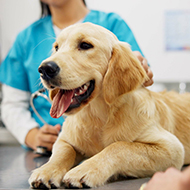Probiotics could reduce weight of obese dogs, study finds
Enterococcus faecium IDCC 2102 and Bifidobacterium lactis IDCC 4301 supported dogs in reducing their body fat.
A new study has found probiotics that could support dogs' weight loss, after identifying a lack of the helpful bacteria in older dogs.
The researchers, from the College of Agriculture and Life Science (CALS) in Seoul, found that administering Enterococcus faecium IDCC 2102 and Bifidobacterium lactis IDCC 4301 supported dogs in reducing their body fat.
The discovery was made as part of the research group’s goal to find probiotics suitable for the long-term and safe treatment of metabolic conditions. They opted to investigate their impact on obesity in dogs, a condition they say affects 50 per cent of the pet population, particularly older dogs.
To identify which probiotics to investigate, the team studied the variations of intestinal microbiota in young and old dogs.
This revealed that older dogs had had a decline in their populations of lactic acid bacteria, namely Bifidobacterium and Enterococcus species. This directed them to focus on these specific strains.
The team experimented with administering Enterococcus faecium IDCC 2102 and Bifidobacterium lactis IDCC 4301, accompanied by a high fat diet, to a group of beagles.
The results of this experiment revealed that these strains were effective in reducing the dogs’ body fat, as well as adjusting the imbalances of intestinal bacteria caused by obesity. Even with the dogs’ high calorie diet, the strains were able to limit dietary intake, enhance excretion, and efficiently activate energy metabolism.
Furthermore, the probiotics proved beneficial for tackling systemic inflammation and disrupted hormone metabolism, which is often caused by fat accumulation.
The group which ingested the strains were found to have lowered inflammation levels and enhanced metabolic activities. They also had an increased proportion of commensal bacteria, which contributes to immunity against harmful bacteria
These changes were found to persist in the dog’s body, with the positive alterations sustaining over time.
Younghoon Kim, the study lead and a professor in the Department of Agricultural Biotechnology at CALS, said: "While types of probiotics suitable for human consumption or commercial livestock have been identified and established, the absence of standardized guidelines for companion animals is a glaring gap.
"Our study aimed to address this deficiency by striving to broaden the spectrum of probiotics applicable to pets across various environments."
The full study can be found in the journal Microbiology Spectrum.
Image © Shutterstock



 The CMA has invited comments on a draft survey invitation letter, as it continues its investigation into consumer experience.
The CMA has invited comments on a draft survey invitation letter, as it continues its investigation into consumer experience.